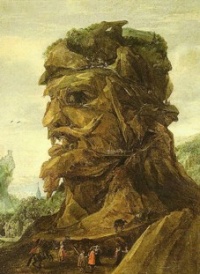Autumn
From The Art and Popular Culture Encyclopedia
|
Related e |
|
Featured: |
Autumn is traditionally the third of the four seasons, when deciduous trees lose their leaves; typically regarded as being from September 21 to December 20 in the northern hemisphere and from March 21 to June 20 in the southern hemisphere.
Contents |
Seasons
Spring, one of the The Four Seasons (early 17th century) by Joos de Momper |
Summer, one of the The Four Seasons (early 17th century) by Joos de Momper |
Autumn, one of the The Four Seasons (early 17th century) by Joos de Momper |
Winter, one of the The Four Seasons (early 17th century) by Joos de Momper |
In popular culture
Harvest association
Autumn's association with the transition from warm to cold weather, and its related status as the season of the primary harvest, has dominated its themes and popular images. In Western cultures, personifications of autumn are usually pretty, well-fed females adorned with fruits, vegetables and grains and wheat that ripen at this time. Most ancient cultures featured autumnal celebrations of the harvest, often the most important on their calendars. Still extant echoes of these celebrations are found in the mid-autumn Thanksgiving holiday of the United States, and the Jewish Sukkot holiday with its roots as a full moon harvest festival of "tabernacles" (huts wherein the harvest was processed and which later gained religious significance). There's also the many North American Indian festivals tied to harvest of autumnally ripe foods gathered in the wild, the Chinese Mid-Autumn or Moon festival, and many others. The predominant mood of these autumnal celebrations is a gladness for the fruits of the earth mixed with a certain melancholy linked to the imminent arrival of harsh weather.
This view is presented in John Keats' poem To Autumn where he describes the season as a time of bounteous fecundity, a time of 'mellow fruitfulness'.
Melancholy association
Autumn in poetry has often been associated with melancholy. The possibilities of summer are gone, and the chill of winter is on the horizon. Skies turn grey, and people turn inward, both physically and mentally. Rainer Maria Rilke, a German poet, has expressed such sentiments in one of his most famous poems, Herbsttag (Autumn Day), which reads in part:
- Wer jetzt kein Haus hat, baut sich keines mehr.
- Wer jetzt allein ist, wird es lange bleiben,
- wird wachen, lesen, lange Briefe schreiben
- und wird in den Alleen hin und her
- unruhig wandern, wenn die Blätter treiben.
This translates roughly (there is no official translation) to:
- Who now has no house, will not build one (anymore).
- Who now is alone, will remain so for long,
- will wake, and read, and write long letters
- and back and forth on the boulevards
- will restlessly wander, while the leaves blow.
Similar examples may be found in William Butler Yeats' poem The Wild Swans at Coole where the maturing season that the poet observes symbolically represents his own aging self. Like the natural world that he observes he too has reached his prime and now must look forward to the inevitability of old age and death. Paul Verlaine's "Chanson d'automne" ("Autumn Song") is likewise characterized by strong, painful feelings of sorrow.






